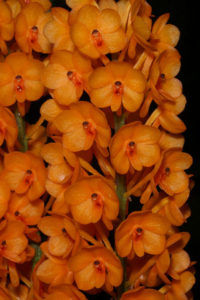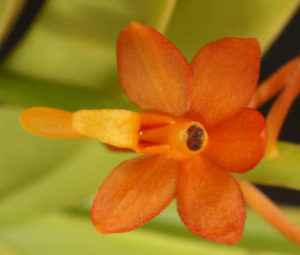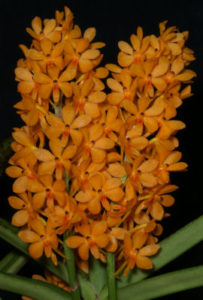The following article was written for the Orchid Species Bulletin published by the Orchid Species Society, which is based in Brisbane, Queensland in December 2011.
Bear in mind that any cultivation notes refer to the subtropical conditions of Southern Queensland, Australia.
 Ascocentrum garayi Christenson was only described by Eric Christenson in Lindleyana in 1992, despite being in cultivation for many years. Christenson named it in honour of Leslie Garay, former curator of the Orchid Herbarium of Oakes Ames at Harvard University, for his work on restructuring the generic limits within the Aëridinae.
Ascocentrum garayi Christenson was only described by Eric Christenson in Lindleyana in 1992, despite being in cultivation for many years. Christenson named it in honour of Leslie Garay, former curator of the Orchid Herbarium of Oakes Ames at Harvard University, for his work on restructuring the generic limits within the Aëridinae.
Plants of Asctm. garayi have usually been incorrectly labelled as the Javanese Asctm. miniatum (Lindl.) Schltr. John Lindley first described the rare taxon from Java, as Saccolabium miniatum in the Botanical Register in 1848. Rudolf Schlechter transferred it to Ascocentrum in Feddes, Repertorium Specierum Novarum, Beihefte in 1913. Asctm. miniatum has a tongue-shaped, strongly decurved lip midlobe, which is shallowly emarginate, so that it appears to be nearly truncate. Asctm. miniatum usually blooms in autumn.
Its leaves are longer, and also often recurved, like those found in Asctm. curvifolium (Lindl.) Schltr., and Asctm. rubrum (Lindl.) Seidenf. Asctm. garayi on the other hand, flowers in spring, and is distributed from Laos, Vietnam, and Thailand. It has an obtusely rounded, strongly concave lip midlobe that is at 90o to the straight, cylindrical spur. In addition, it has shorter leaves, which are rigidly straight. The leaves of Asctm. garayi are often spotted with red or purple.

Asctm. garayi is a compact, to medium-sized monopodial plant, which produces stout, erect stems that are 15-25 cm, or so, tall. The stems are covered at the base by persistent, overlapping, leaf-bases. Mature plants produce new growths from the base, so that multi-growth specimen plants, will eventually develop. At the apex of the erect stems are several pairs of two ranked, strap-shaped leaves, which are cleft or two-toothed at the apex. Its mid-green, thickened, very rigid leaves are 5-25 cm long, and 1-1.4 cm broad, and are usually spotted with red-purple on the upper surface.

Each stem produces several, erect, axillary inflorescences, which are raised above the leaves. The racemes are up to 24 cm long, and bear many (up to 40), densely arranged, showy flowers in a sub-cylindrical raceme. The flowers of Asctm. garayi are brilliant golden-orange, and are 1-1.5 cm across, with broad sepals and petals, and a spurred lip. Contrasting with the rest of the flower, is the dark red-brown anther cap, on the end of the short, terete column.
Southeast Queensland climatic conditions seem to be ideal for this species. Cultivate Asctm. garayi in a basket, or pot, using a coarse, or well-drained medium. Its thick white roots seem to like to dry quickly between watering. During the warmer months, ensure that the humidity is high, with constant air circulation at all times. Provide it with 60-70% shade, with plenty of water while the root tips are green. Applications of liquid fertiliser will also be beneficial, while it is actively growing. In winter, a drier rest period, with a minimum of 12oC is important to help initiate flowering in late spring.
